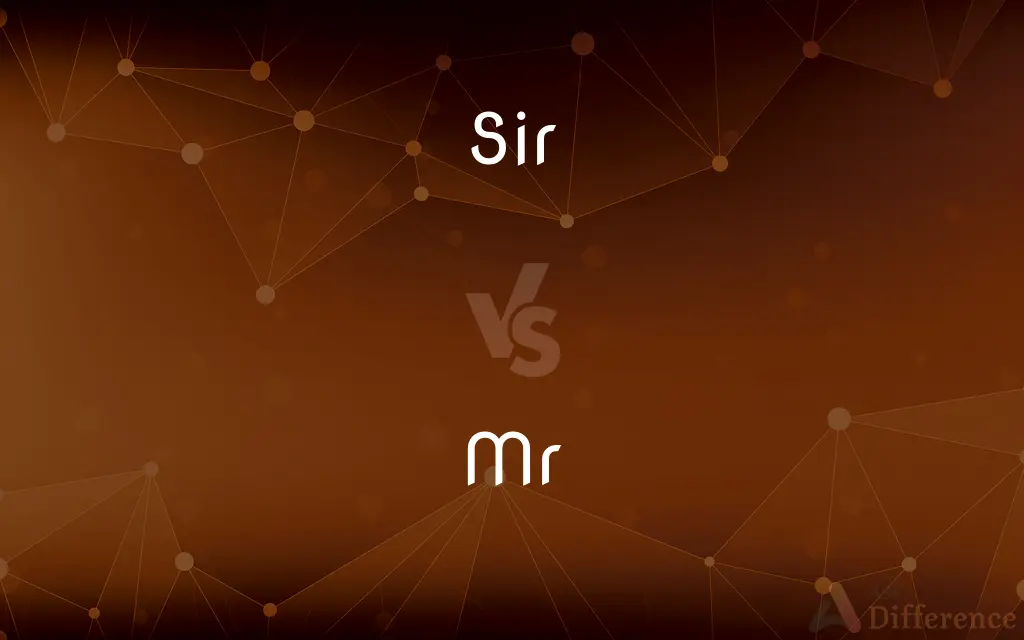Sir vs. Mr — What's the Difference?
By Tayyaba Rehman & Maham Liaqat — Updated on April 7, 2024
Sir is a formal title of respect, often used before a first name or alone, while Mr. is a prefix to a surname indicating a male individual.

Difference Between Sir and Mr
Table of Contents
ADVERTISEMENT
Key Differences
Sir is a title of honor or respect used in various contexts, often preceding a first name or as a standalone address in formal settings. Mr., on the other hand, is a conventional prefix used before a man's surname, signifying gender without implying rank or honor.
Sir has historical roots in chivalry and nobility, associated with knights and baronets in the UK, where it precedes a knight's first name. Mr. is more universally applied, without implications of nobility, used to address any young male regardless of social status.
The usage of "Sir" can also signify a form of deference or respect in professional or formal situations, such as addressing a teacher or a superior officer. Whereas, "Mr." is a neutral form of address that doesn’t inherently convey a level of respect beyond acknowledging young male status.
In certain contexts, "Sir" is used as a form of polite address to any man, especially in service-oriented interactions, regardless of the man's knighthood status. "Mr.," however, remains a prefix tied to the individual's surname, used in both formal and informal settings.
Titles like "Sir" carry a sense of prestige and are often associated with achievements recognized by a society or monarch, such as being knighted. The use of "Mr.," while respectful, doesn't denote any special recognition or honor beyond the social norm.
ADVERTISEMENT
Comparison Chart
Usage
Before first name or alone
Before surname
Context
Formal, conveying respect or honor
Universal, indicating male gender
Implication
Honor, nobility, or deference
Gender identification, young male
Historical Association
Chivalry, knighthood
Generic young male address
Prestige
Associated with achievements or status
Neutral, without special recognition
Compare with Definitions
Sir
A man awarded a non-hereditary title by a monarch or other political leader for service to the monarch or country, especially in a military capacity.
After years of service, he was honored as Sir John Smith.
Mr
A title used before a surname or full name to address or refer to a man without a higher or professional title.
Mr. Smith will see you now.
Sir
Used in service industries to politely address male customers.
How may I assist you today, Sir?
Mr
Used in formal settings for introductions or announcements.
The speaker, Mr. Thompson, has arrived.
Sir
A title implying or expressing high status, respect, or esteem.
The title of Sir is an honorific bestowed by the monarchy.
Mr
Applies to any man regardless of marital status or professional standing.
Letters are often addressed to Mr. as a general salutation.
Sir
A way of addressing someone with high respect or deference, especially in professional settings.
Students addressed their principal as Sir to show respect.
Mr
A standard form of address for men, implying respect without indicating rank.
Please, call me Mr. Jones.
Sir
A formal title used before a man's first name or as a standalone form of address to show respect.
Sir Isaac Newton made groundbreaking contributions to physics.
Mr
Mister. Used as a courtesy title before the surname or full name of a man. See Usage Note at Ms.
Sir
Sir is a formal English honourific address for men, derived from Sire in the High Middle Ages. Traditionally, as governed by law and custom, "Sir" is used for men titled as knights, i.e., of orders of chivalry, and later also applied to baronets and other offices.
Mr
Used in informal titles for a man to indicate the epitomizing of an attribute or activity
Mr. Suave.
Mr. Baseball.
Sir
Sir Used as an honorific before the given name or the full name of baronets and knights.
Mr
Abbreviation of millirem
Sir
Used as a form of polite address for a man
Don't forget your hat, sir.
Mr
A form of address for a man
Sir
Used as a salutation in a letter
Dear Sir or Madam.
Sir
A man of a higher rank or position.
Sir
A respectful term of address to a man of higher rank or position, particularly:
Sir
To a knight or other low member of the peerage.
Just be careful. He gets whingy now if you don't address him as Sir John.
Sir
To a superior military officer.
Sir, yes sir.
Sir
To a teacher.
Here's my report, sir.
Sir
To address (someone) using "sir".
Sir, yes, sir!
Don't you sir me, private! I work for a living!
Don't you sir me, private! I work for a living!
Sir
A man of social authority and dignity; a lord; a master; a gentleman; - in this sense usually spelled sire.
He was crowned lord and sire.
In the election of a sir so rare.
Sir
A title prefixed to the Christian name of a knight or a baronet.
Sir Horace Vere, his brother, was the principal in the active part.
Sir
An English rendering of the LAtin Dominus, the academical title of a bachelor of arts; - formerly colloquially, and sometimes contemptuously, applied to the clergy.
Instead of a faithful and painful teacher, they hire a Sir John, which hath better skill in playing at tables, or in keeping of a garden, than in God's word.
Sir
A respectful title, used in addressing a man, without being prefixed to his name; - used especially in speaking to elders or superiors; sometimes, also, used in the way of emphatic formality.
Sir
Term of address for a man
Sir
A title used before the name of knight or baronet
Common Curiosities
How does one earn the title "Sir"?
The title "Sir" is typically earned through notable achievements or contributions, often being knighted in countries recognizing such honors.
What's the difference in respect implied by "Sir" and "Mr."?
"Sir" implies a higher level of respect or honor, often associated with formal or distinguished circumstances, while "Mr." is a neutral form of address.
Can "Sir" be used in casual settings?
While it can be used to express politeness or respect, "Sir" is generally more formal than "Mr."
Are there equivalents to "Sir" and "Mr." for females?
Yes, equivalents include "Madam" or "Ma'am" for "Sir," and "Miss," "Ms.," or "Mrs." for "Mr."
Do cultural differences affect the use of "Sir" and "Mr."?
Yes, cultural norms and the importance of formality in different societies can influence how and when these titles are used.
Can "Sir" be used without a first name?
Yes, "Sir" can stand alone as a form of address, especially in service or respectful contexts.
Is it possible to decline the title "Sir"?
Yes, individuals may decline a knighthood or other honors for personal or political reasons.
Can women be addressed as "Sir"?
Traditionally, no. However, in certain professional or military contexts, women in positions of authority may be addressed as "Sir" as a mark of respect.
Is the use of "Sir" declining in modern communication?
In some contexts, yes, as communication becomes more casual and titles less emphasized, but "Sir" remains a sign of respect in many situations.
How do businesses and institutions decide when to use "Sir" or "Mr."?
Usage often depends on the formality of the situation, the preference of the person being addressed, and the organizational culture.
How do titles like "Sir" and "Mr." reflect societal values?
They reflect cultural norms around respect, formality, and social hierarchy, indicating the value placed on honor, status, and politeness.
Can "Sir" and "Mr." be used interchangeably?
Not typically, as "Sir" and "Mr." serve different purposes and convey different levels of respect and formality.
Share Your Discovery

Previous Comparison
Hope vs. Hopeful
Next Comparison
Institute vs. FoundationAuthor Spotlight
Written by
Tayyaba RehmanTayyaba Rehman is a distinguished writer, currently serving as a primary contributor to askdifference.com. As a researcher in semantics and etymology, Tayyaba's passion for the complexity of languages and their distinctions has found a perfect home on the platform. Tayyaba delves into the intricacies of language, distinguishing between commonly confused words and phrases, thereby providing clarity for readers worldwide.
Co-written by
Maham Liaqat














































